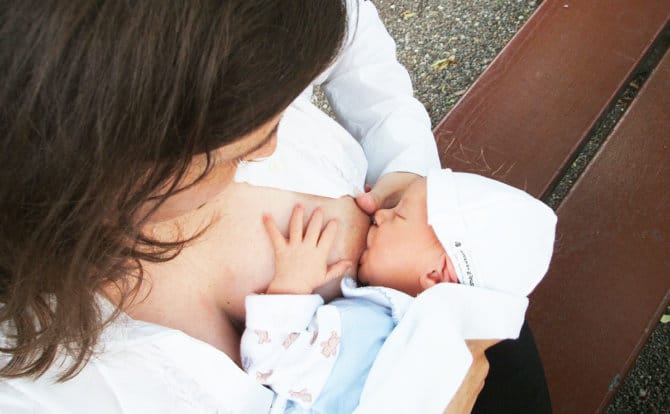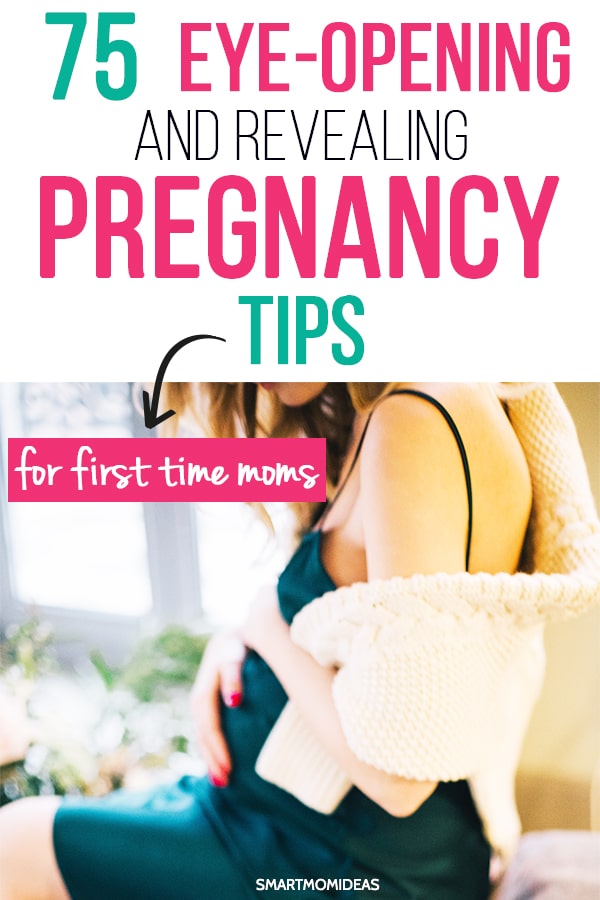Get these 70+ early signs of pregnancy for new moms to help you for the first time.
The journey to becoming parents is a big chapter in our lives!

From deciding with your partner if and how many children you want, to maneuvering your life to fit a family, the process to becoming a first time mom is filled with excitement, worry, apprehension and joy.
The journey for me to get pregnant with twins was filled with a lot of heartache and fails, but I’m so happy I went though that so I can be where I am today.
I hope these 75 tips and advice for new moms – from conception to breastfeeding and more will help you while you’re pregnant.
All moms in this guide gave me permission to feature their best tips.
70+ Early Signs of Pregnancy Advice for New Moms
I’ve split up this guide as a journey to being a mom. I start with conceiving and provide tips to help with TTC. I then move on to offering pregnancy tips for a first time mom on when they found out they were pregnant.
The next two parts are on pregnancy and labor. The advice in these sections are golden!
I then have a special section on giving birth as a first time mom. It can be scary so I want to give you as much support as possible. From there we move onto the next chapter of a first time mom – postpartum advice.
Your newborn steals the show after this, however, and my advice focusses on newborn tips, breastfeeding tips and sleep tips. Have fun reading!
On Conceiving

Be diligent about taking your temperature the second you wake up. When you see that dip and spike in your basal temperature, it’s a good indication you’re ovulating and it’s time to have sex! Lots of it for good measure.
—Jamie of Simple Living Mommy
Here’s a good basal temperature thermometer for ovulation when trying to conceive.
Get on a good prenatal vitamin before trying to conceive. Starting on a prenatal before you even start trying to conceive will ensure your nutrient levels are good to go for when you do become pregnant.
—Trina of Mom Smart Not Hard
Fixing the habit of dehydration before pregnancy will lead to an easier adjustment when the hydration needs increase for pregnancy.
—Lindsey of Mother Rising
The kind of foods you eat can determine how fertile you are. Eating more fiber increases the chance of ovulatory fertility. [It] can also help with male fertility and reproductive health.
—Jennifer of Habitat for Mom
When trying to conceive, try having Red Raspberry Tea Leaf.
There are a host of benefits to drinking Raspberry tea for conception such as: strengthening the uterus wall to reduce miscarriages, help with implantation, enriching the uterus with vitamin C, E, A and B and even help labor go quicker!
Get your husband to drink it also!
Schedule a prenatal visit with your doctor or midwife. He will guide you about the importance of a proper nutrition and a healthy weight. This way, you can avoid things such as gestational diabetes, hight blood pressure, or any other risk that may affect you and your baby during your pregnancy.
—Shirley of Smart Cents Life
Don’t just reach for any lubricant. A regular lube can be full of sperm killing ingredients, and make it harder for you to get pregnant. It’s time for you to start using a fertility friendly lubricant. This type of lube is designed to help you get pregnant. Not only does it make you feel better during sex, but it makes it a whole lot easier for the sperm to reach the egg.
—Ray of Stork Mama
A safe fertility lubricant like Pre-Seed can make conception fun and help the little swimmers get to their destination point!
Using affirmations can be a powerful way of inviting a baby into your life. I believe that the more specific the affirmation is, the more helpful it is. One of the many things I did to help myself overcome infertility and get pregnancy successfully twice was to use affirmations.
—Anna of To Make a Mommy
When focused on improving fertility, some of the most important nutrients to include in your diet are iron, folate, essential vitamins and minerals like vitamins B, C, D, and zinc, plus essential fatty acids (omega-3s). And good news, all of these nutrients are also great for improving male fertility, so get your partner on board with your healthy eating routine too!
—Caroline of Swaddles N’ Bottles
I do think that weight is a huge issue for a lot of infertility. If you’re not getting pregnant you might want to look at your weight and how you might work on either gaining or losing.
—Hilary of Pulling Curls
First Time Finding Out You’re Pregnant

Decide when to announce your pregnancy. I always wait to announce my pregnancies publicly until the second trimester. I think family is okay to tell, but it can be smart not to tell the whole world until after the first trimester is over.
—Chelsea of Life With My Littles
You question the safety of EVERYTHING. Am I allowed to eat ____ (fill in the blank)? Is my deli meat hot enough? Will jumping jacks cause brain damage? Can I lay on my stomach? Can I get a massage? Can I heat up my food in those plastic storage containers?
—Britney of Britney L Bergman
Download fun pregnancy apps. These pregnancy apps gives you a lot of information about your pregnancy and your baby by providing you with how many weeks you are, your baby’s height, weight, how your baby is developing and even what part of the body is forming!
—Ros of Stress Free Mommies
Make sure to download the free Baby Tracker app when you first become pregnant.
Talk to your insurance company. You’ll need to let your insurer know that you’re pregnant. Especially if you’re covered for pregnancy so you’ll know what you can claim. This is a great time to find out if you’re eligible for a free breast pump under the Affordable Care Act and make sure you get it – pronto!
—Cath of Making of Mom
Snap a selfie. When my husband and I found out that we were expecting, we took some photos on my phone. Now, when I look back at them, I remember the feeling and that day very well. You don’t have to share the photos with anyone, especially if it was a special moment between you and your spouse.
—Julie of The Newbie Mom
Think about where you would like to register. I know, a registry seems like it is so far off. But, trust me, the time is going to fly by and when you start looking at all the products that others will claim you need for a baby, you will need some time to figure it all out.
—Alyssa of Penlights to Pacifiers
When I was pregnant with twins I used Amazon’s Baby Registry since I have family living in different countries.
Read pregnancy books. Books that have a lot of information, such as month to month changes, explain all the development going on, and talk about labor and delivery are very helpful.
—Julie of Fab Working Mom Life

A very good book and resource to have during your pregnancy is Ina May’s Guide to Childbirth.
Trust me, when the time comes, you won’t have time to read books or even blog posts about going through labor.
And childbirth is something to think about early in your pregnancy!
Unfortunately, stretch marks are very common during pregnancy. There are special pregnancy lotions to help with skin elasticity that will help reduce the likelihood of getting stretch marks. Apply it as often as you can from the moment you find out your pregnant to the moment you give birth to help reduce the chance of getting them.
—Mary of Life as Mama
Using an oil like this one will help reduce the visibility of stretch marks. Apply on your abdomen when you find out your pregnant!
On Pregnancy

One of the biggest things that helped me cope with my first trimester fears was looking up information that worked against them. I looked up statistics that were in my favor and they helped me believe that everything was going to be okay.
—Alexandra of Coffee and Coos
Wait until closer to the second trimester to announce a pregnancy. By that time you’ve likely heard the heartbeat and I’ve always heard that once you hear the heartbeat the chance of miscarriage goes way down.
—Lindsey of Mother Rising
Eat whatever you can, whenever you can. One of the reasons that “morning sickness” can be worse in the morning is that having an empty stomach tends to bring it on. But when all the “healthy” food is gross, your stomach might be empty… alot. So don’t worry about nutrition, don’t worry about calories. If you find something that you can eat, eat it.
—Carly of Mommy on Purpose
Start a pregnancy journal. When I read through the journal (and I do 2 years later!), it’s filled with cherished memories – something I’m very thankful to have.
—Elaine of Mom Blog for Life

Having those keepsake memories like your first ultrasound, your bump pics, special babymoon trips and more will be one of the best things you did when you became pregnant.
A pregnancy journal like this one has prompts for you to write, is small enough to carry everywhere and asks the most important questions for you to reflect on!
Prenatal depression occurs during pregnancy and can be triggered by many factors. Although some mothers are able to continue to take care of their bodies during depression, others struggle to eat healthy food or avoid alcohol and other harmful substances.
—Julie of Fab Working Mom
Dogs can tell you’re pregnant even in the first trimester. They just don’t know how many puppies you’re having. Before your baby arrives, get a baby doll that matches your skin color. Starting when you’re about 7 months pregnant, play house for 20 minutes (or more) every night. Nurse the baby doll, play with it, put it in a baby carrier attached to your body – do anything you can think of.Kelly of Happy You Happy Family
[Morning sickness] strikes at any time of day and night. It can be constant – as it was in my case with both pregnancies. Try to remember to drink a lot of water, eat simple foods like soup and dry toast or crackers and get some early nights. It will pass.
—Vicky of The Mummy Bubble
Here is my guide to relieving yourself from morning sickness in natural ways!
During pregnancy, the hair on your body tends to grow a lot faster due to an increase of your androgen hormone. Believe me when I tell you that I always walked around with a pocket mirror and a pair of tweezers in my purse during pregnancy.
—Mallaury of Life of Babe
Your symptoms might not be textbook. When the only pregnancies you’ve ever really seen have been on TV, it’s easy to believe that all pregnant women are constantly heaving and also craving pickles and ice-cream. However, everyone’s pregnancy symptoms vary.
—Gill of A Baby on Board
As a mom to twins, my pregnancy DID have a lot of morning all-day sickness and food aversions for the first and some of the second trimester!
It’s a known fact that Vitamin B6 can help decrease the symptoms of nausea and vomiting during pregnancy. So, consuming foods that are packed with this element (such as chicken, turkey, nuts, chickpeas, legumes) can help ease that stomach.
—Liesel Labor Teen
If you’re having those dreaded calf cramps (sigh, I get them all the time in the third trimester) [e]at a banana! It really helps relieve cramping that night.
—Katie of Happily Ever Mom
[M]ost household cleaning products […] do contain hazardous chemicals intended to fight grime and bacteria. These chemicals can be harmful to an expectant mama and baby and should be avoided during this fragile period of development…especially during the first-trimester.
—Ana of Mommy’s Bundle
In my home we like using a combination of vinegar and dish soap. But for my bathrooms I like to use Mrs. Meyer’s products as they do a phenomenal job at cleaning grime and dirt.
On Labor

You can do anything for 10 seconds. Even though contractions last anywhere from 30 seconds to 2 minutes, the PEAK of intensity roughly lasts about 10-15 seconds. So, if you can think about it this way, you may be able to mentally get through them better. Sure, the whole contraction is going to last awhile, but the terrible, awful, gut wrenching part really only lasts 10-15 seconds. You can do anything for 10 seconds!
—Liesel of Labor Teen
Your contractions and labor pains while giving birth can feel fabulous! You have a POWERFUL tool on your side when it comes to the experiences you’re going through as a mother. It’s your brain.
—Sarah of My Natural Baby Birth
By simply changing positions and moving your body around while you’re in labor, will help make the entire process a bit easier.
—Paula of Easy Baby Life
For more life-saving tips during labor, check out my guide!
Hold [a hair comb] so the spikes dig into the crease where your fingers meet your palm. You can even use one for each hand. Also, the spikes will hit lots of acupressure points to trigger your body’s natural painkillers.
—Ray of Stork Mama
With a gentle caesarean, your doctor or midwife can collect a vaginal swab and wipe it on your baby’s skin and in his or her mouth to contribute toward a positive microbiome. When a baby goes through the birth canal during a vaginal birth, he or she is exposed to a plethora of microbes – in baby’s mouth and on the skin. These bacteria help build a healthy microbiome for your baby, which could reduce his or her risk of inflammatory illnesses like Crohn’s disease, heart disease, infections, and much more. The absence of this bacteria transfer in cesarean babies might explain why some studies have found that cesarean babies have higher rates of asthma, allergies, obesity, and other health concerns.
—Genevieve of Mama Natural
Eating pineapple is one of the most common ways to induce labor. Eating pineapples is beneficial because they help ripen your cervix and make labor easy.
—Sia of Diary of a Fit Mommy
An easy way to prepare your body for labor is to see a chiropractor. Seeing a chiropractor during my pregnancy saved my life. I started experiencing pelvic pain when I was pregnant with my daughter. The pain got progressively worse as I got bigger. Dr. Amanda adjusted me throughout the remainder of my pregnancy and I had a smooth delivery.
—Mallaury of Life of a Babe
Don’t scream during your pushes. My nurse kept telling me that I wasn’t getting everything out of each push because I was wasting too much of my energy on screaming. Hone in on that push. Let it be all you think about. Dig deeper! Find whatever energy you have left and push! You are a woman! You are fierce! If millions of other women can do this so can you!
—Gretchen of Mom for Moms
I really feel like the best way to accomplish [labor] (as I’ve discovered over my eight births) is to distract yourself.
—Lisa of Miracle Maker Mom
And one of the best ways to distract yourself is to use a birthing ball.
Sit on it, rock on it, bounce on it and distract yourself away from the pain of labor.
By doing these movements on a birthing ball, you can move labor along and open up your cervix.
On Giving Birth

[After delivering your baby] the third of the stages of labor is the delivery of the placenta. Your uterus will continue to contract until the placenta is delivered. The doctor will likely push on and rub your abdomen to help the placenta dislodge from the uterine wall. There may be quite a lot of blood at this point, but don’t let that alarm you. Some women find this stage of labor painful, others report only mild discomfort. I have given birth twice and honestly don’t even remember delivering the placenta at all. I guess I was totally occupied with our baby on my chest.
—Paula of Easy Baby Life
Unless there are any complications, it’s always a good idea to give you and your child a few minutes to still be attached to the umbilical cord. Ask your eager midwife or overly excited partner to wait at least 5 minutes before cutting the cord. This will allow the blood and any nutrients left in the cord to be delivered to the baby. It also gives the baby a chance to have something ‘familiar’ while adjusting to the outside world. As for you, savor this moment as this is the LAST time you are physically attached to your baby.
—Kiyshia of Mommy Intentionally
[You are] forced to get up and walk. I had never heard of this requirement in my life, but a mere 90 minutes after giving birth for the first time, I was told I had to get up and walk to the bathroom. I have no idea what the medical reason is for this, but I can tell you it was downright terrifying. First of all, I had an epidural that was not fully worn off yet and one of my legs was still numb. I also had brand new stitches from “many” second degree tears down there. Not to mention the blood loss. All of these factors combined made for quite the show out of my hobble to the bathroom which was probably only 3 yards from my bed.
—Caitlin of Real Mom Recs
Giving birth is absolutely beautiful and completely horrifying, and you need all the background and information you can get to help keep your cool during labor.
—Betty of The Terrific Five
I suggest taking an online birthing class to equip you with the right information when you’re in labor and giving birth.
To a lot of mother’s surprise, the contractions don’t stop after you give birth. These postpartum contractions are called “after pains.” While they are not as intense as your active labor contractions, they are definitely noticeable. After pains happen because the uterus is contracting to help shrink it back down. These contractions are especially noticeable while breastfeeding. This is because nipple stimulation causes the uterus to contract.
—McKayla of Motivation for Mom
From talking around and a doing a little research, it appears afterbirth pains aren’t as bad with your first pregnancy. In fact, I don’t remember it after my first baby at all.
—Jenny of Sunny Home Creations
[A]pplying warmth to your perineum when baby is crowning can help prevent the worst tearing – and give you some relief!
—Elna (that’s me!) of Smart Mom Ideas
Best Postpartum Tips

After you get home from the hospital and weeks later your body is recovering from labor and you are adjusting to life as a new mom. So you’ll want to prepare meals ahead of time that you can stick into your freezer.
—Kara of Dollar Mommy Club
Check out my make-ahead freezer meal list for your postpartum days home – one of the best advice for new moms!
You’re likely nervous about your first trip to the potty after giving birth, and that’s normal – not to scare you MORE, but straining is obviously gonna be hard on tears or stitches.
—Carly of Mommy on Purpose
To help you with your postpartum recovery and go to the bathroom pain free, make sure to pick up some stool softeners.
Soak it up. Just about everything else can wait. Those first few hours (days? weeks?) are just about you and your new baby. Let your husband take care of texting friends and family and taking/sending pictures of the baby. If you’re baby was healthy and crying at birth, all tests can be delayed for a few hours (I did let them weigh my baby after our first hour / hour and a half).
—Elisabeth of Elisabeth McKnight
I can’t tell you how helpful my protein shakes are. I just don’t have time with a new baby and toddlers to whip up a bunch of healthy meals. Some moms are great with cooking and meal prep. I am not.
—Katie of Joyful Messes
If you had an epidural or a c-section, you probably had a foley catheter. You might not have felt it going in because you were fairly numb, but you’ll probably be painfully aware that it was there once you try to pee on your own again. ouch! Your urethra is just irritated and will be sensitive for a few days.
—Heather of A Life in Labor
In general you should be bleeding less and less each day. If you notice a lot more bleeding suddenly, that’s mother nature’s sign that you’re working too hard. Even if you think you’re not
— do less. Your body needs that!
—Hilary of Pulling Curls
Yes, Baby will come first for pretty much the remainder of my life, but I would actually argue that in the first week postpartum, you should plan to put your self-care first. In order to take good care of a baby, your body, mind and soul need to be cared for.
—Terrin of Mom Blah
After delivery – particularly if you had an epidural and weren’t able to eat or drink for a long stretch of time – you’ll be dehydrated. Delivery a baby means you lose a lot of blood and need to replenish your fluids. Drink as much as you need and want afterwards to rehydrate. Once you bring breastfeeding staying hydrated 24/7 will be crucial to maintain your milk supply. Keep a glass or water bottle with you and drink up every time you nurse and in-between feedings.
—Corinne of The Pragmatic Parent
Newborn Tips

My first-born was so colicky every night and sometimes during the day as well. It didn’t occur to me that it was MY diet that was causing her gas and made her colicky! Once I changed my diet, I noticed aHUGE change in her!
—Sherri of Italian Polish Momma
In baby’s first few days, the urine can be so concentrated that uric acid crystals show up as a color. We call this ‘brick dust’. It is pinky orange (almost salmon-like) in color and can be easily be mistaken for for blood. Although alarming, brick dust is temporary and will go away once baby is drinking larger volumes of milk.
—Cindy & Jana
Babies sleep A LOT! Like 16-20 hours. They also eat, pee and poop a lot too! So yes your baby will be sleeping a lot but your baby will also wake up a lot. Newborns don’t function like us. They have tiny tummies, bladders, and bowels that need to be refilled and emptied often. The reason for this is the insane rate that they are growing at.
—Erin of The Best of the Middle
An important tip that I learned from my family members is that if your baby is content and not crying there’s no need to be carrying him/her all of the time. You can get things done if your newborn baby is not used to the arms. You can cook, clean the house a little bit and even sit down to relax. Yes, I used to cuddle with all three of my babies but I didn’t get them used to my arms.
—Ros of Stress Free Mommies
When I was just a couple of weeks post-giving birth to my first daughter I expected myself to have it all figured out. So I was of course very disappointed in myself that I didn’t. Far from it in fact. The truth is that things are very different when you become a parent and far from trying to force things back to the way they were before, you need to just surrender to the change.
—Vicky of The Mummy Bubble
[Be careful for habituating]. Basically, your infant is verging on the brink of overstimulation, and so shuts down. She looks like she’s sleeping, but really she’s trying to self-soothe. It’s common for babies until they are 6-8 weeks old. How do you know if your newborn is habituating? She will wake fussy and irritable, like she hardly slept at all. (Yeah, I know. That’s no flashing neon sign.)
—Heather of Mighty Moms
Moms will swear by vibrating chairs or swings to calm a colicky baby. If you have a bouncer or baby swing with a vibrating motion give it a go. An inexpensive way to get the same effect it to put your baby in a car seat or pram near a washing machine. As the machine spins the vibrations will gently sooth your baby. And let’s face it you have a baby so your washing machine will never be off.
—Ray of Stork Mama
Another possible reason your baby is crying is due to the temperature. Is your baby overbundled? Is it a little chilly in the house? Most people assume babies are cold and overdress them, but pay attention to signs. If you see a lot of squirming it could mean your little one is working up a sweat.
—Ana of Mommy’s Bundle
Track your baby’s schedule. When you go into the doctor’s office for checkups, they will ask for how your baby has been eating, sleeping, and pooping.
—Audrey of Mommy Enlightened
Using a baby tracker can help a sleepy mama and ensure that your doctor will get accurate information.
With my twins, I had to have a baby tracker (and a mom and dad tracker too) to make sure I wasn’t missing any feedings or if one twin had less diapers than the other. For you, use this advice for new moms if you want to have less stress in your days!
Use wipes for everything. When you head to the store, you’ll be inundated with a wipe for every possible thing – wiping noses, cleaning pacifiers, face wipes….well, you don’t need them! Baby wipes are so multi-purpose.
—Katie of Clarks Condensed
Fact: five years later and I still buy and use wipes in the family for a wide range of things! I can’t see being without them.
Showering, eating, socializing and cleaning will be a challenge. You will experience a whole new level of exhaustion. This is why you need help from family, your significant other, and friends.
—Darcy of A Modern Mommy
Breastfeeding Tips

Sometimes breastfeeding experiences don’t go as planned. Sometimes we have to throw out those expectations and let come what may.
—Heather of The Pumping Mommy
This is true! I was set to breastfeed my twins – and I did, but not exclusively. I had low milk supply and had to find ways to supplement my breast milk and increase my milk supply to accommodate two hungry babies!

Focus on your baby. A lot of times when I became nervous about breastfeeding in public, I would just look down at my son and watch him as he was nursing. And suddenly I would forget that there was anyone else around us. Because seeing how happy and healthy he was from me feeding him made me remember why I decided breastfed him in the first place. For me, I learned that other people’s opinions did not matter at all. My son was hungry and I needed to feed him which is all that I cared about.
—Heather of Very Anxious Mommy
If you’re not already familiar with the “Breaktime for Nursing Mothers” law, I definitely recommend taking a look at it! The law went a long way towards making pumping at work possible for many women. In a nutshell, this law requires companies of any size to allow women to take time out of their day to pump if they are an hourly employee. The law also requires companies to provide a space for nursing women to express milk. Thanks to this law, many companies now have “Mother’s Rooms” for nursing women to use. These spaces don’t need to be permanently dedicated to nursing mothers but they must be created as needed. A bathroom is not an acceptable space. Further, the room must be private. Women no longer have to pump in their cars or in the bathroom!
—Rachel of The Analytical Mommy
However, it will get better….just give it time. The first few weeks of breastfeeding can be exhausting, painful, emotional, and draining. The best advice anyone can ever tell you is HANG IN THERE!
—Sherri of Italian Polish Momma
When Weston was very young, I always found myself (and my baby) covered in breast milk after every nursing session. Milk would spray all over the place and leak out the side of his mouth. A few weeks in, I came up with a strategy to save my shirt when breastfeeding. I always took decent sized burp rag and tucked one side into the bottom of my unhooked nursing bra (inside right under my breast). It’d take the other side and tuck in under Weston’s chin. Maybe my kid is just a messy eater, but this strategy saved me from so many extra loads of laundry.
—Alexandra of Coffee and Coos
Have hubby get you a snack and drink during every nursing session. The best way for a new daddy to help with nursing the new baby is to make sure mama is well taken care of! By nurturing me and helping me to get the nutrients and fluids I need, my husband is helping me to relax and just focus on creating our breastfeeding relationship.
—Jamie of Simple Living Mommy
When you’re in the hospital before discharge. Ask everything you want. And I mean everything. Don’t hold back. Trust me. There are no dumb questions when it comes to breastfeeding, and nurses have seen and heard everything. Your nurse will give you the best breastfeeding tips for beginners since she knows your situation and has seen many cases.
—Tere of Preemie Mom Tips
Keep an eye out for signs of oversupply. You may be thinking “Oversupply sounds great! I want that!”… but it can actually be pretty rough. Oversupply can cause some issues for both mama and baby, including mastitis. With oversupply, your let down may be so forceful that it can cause baby to cough and gag. It can also give you too much foremilk and not enough hindmilk (where are the good stuff is).
—Caroline of Swaddles N’ Bottles
On Sleeping

Getting into a pattern is good, and eat, wake, sleep is a great cycle for your baby. When he wakes up, feed him right away. Let him have some awake time (playing with him, letting him have tummy time, reading to him, etc.), and then put him down while he is still awake but before he becomes overtired.
—Aliesha of Feathers In Our Nest
From birth to about age four to five months, babies innately possess a startle reflex, in which they feel as if they are falling. The sensation of falling causes jerking movements, and the baby will incidentally wake up. Keeping a tight swaddle prevents babies from startling themselves awake, helping the newborn baby sleep both better and longer. I like to think of the baby as ‘snug as a bug in a rug,’ and I used to tell my son this every time I’d swaddle him snugly.
—Lauren of The Military Wife and Mom

I used the HALO sleepsack for my twins up until they had to be potty trained! They worked wonders and helped me get a sleep schedule for my twins.
What’s great about them is that they also have a fuzzy sleep sack.
Where we live it snows 10 months out of the year and I wanted to ensure my twins were snuggly and warm in their crib.
Your newborn baby is going to wake up. A lot! That’s just what newborns do. I don’t want any of these tips to make you think that your brand new baby should be sleeping a full night, that’s completely unrealistic, and unhealthy for your baby.
—Kate of Sun Kissed Kate
Babies have something called a Waketime Window that determines how overtired they are… It’s vital that you get your child down for a nap before that window closes, or his brain will get overstimulated! That means it’s a LOT harder to get your child to settle down for a nap or at bedtime. It also means your child may start waking up more at night!
—Heather of Mighty Moms
A lot of people mistakenly believe that a bedtime routine isn’t necessary until your baby is older. However, babies are smarter than we think. They can start to identify patterns at as little as 6 weeks old.
—Brenda of Paper Heart Family
The [first week] is exhausting. It’s a 24 hour round the clock care. Babies do not have internal biological clocks their first few weeks. There will be a lot of sleeping, but it won’t necessarily be at night when you want it to happen. The first few days, they sleep about 15-18 hours a day, in 2-4 hour stretches.
—Shantall of Urban Mom Tales
In addition to transitioning Ellie to sleep in the crib at night and letting her cry to settle, we firmly decided that we would not rock or nurse her to sleep as a part of her bed or nap time routine. We read that if she was going to learn to remain sleeping through the many transitions in a baby’s overnight sleep cycle (and ever STTN!) that she needed to learn to settle herself without these common sleep aids.
—Holly of Learning Momma
Do what works for you mama! I often had to put my twins in a Moby wrap or rock them to sleep (it was a merry-go-round in my house of feed, diaper #1, diaper #2, distract while rock #2, rock quietly #1, sleep #2 and sleep #1).
“[S]leep associations,”… is basically something that the child only associates with sleep. Something I believe in very much is WHITE NOISE. It was heaven-send when Jack was baby. I think it helped his mind be at peace, and it also drowned out any other noise.
—Katie of Clarks Condensed
When a baby is placed in a crib, in dead silence, that silence can be deafening to a little one. Playing background music in soothing classical tones, or nature sounds such as rain or waterfalls helps calm a frantic baby down and reunites them with constant noises like they were used to.
—Kate of Maternity Glow
My twins loved their Sleep Sheep.
It came with white noise and doubled as their lovey!
Every night I would place it in the middle of their crib and one twin on each side.
I was able to get a good 5-6 hours of uninterrupted sleep for this tired mama!
Closely Regarded Advice for New Moms
Wow! Over 5,000 words of valuable and important advice for new moms. I hope this guide helps you through the entire process of starting a family!
This truly is a life-changing chapter in our lives! Hit reply and tell me your best tips for new moms! I want to hear them!
Please pin me!






Leave a Reply